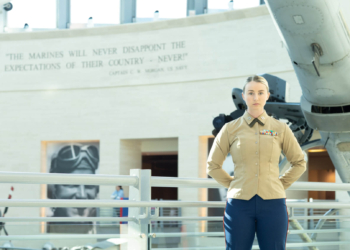“I’ve always been a caregiver because I’m a nurse,” Shirley Stanton said. “But a few years after my son was injured and he asked me to be his caregiver, everything changed.”
Stanton’s situation is a familiar one for parents who become caregivers, as they transition to a new relationship with their adult child. Now Stanton and her son, Tim, spend a lot of time together, but it’s different.

Just as military service members stand between the nation and their enemies, those who care for wounded military veterans stand between the veteran and their enemy. There are over 5 million military caregivers according to a recent RAND Corporation study, and 1.1 million of them are caring for veterans who served after 9/11.
Caregivers are as diverse as the service members they care for. They are parents, spouses, children and friends. They are stay-at-home parents, teachers and students. Some of them are service members themselves, like Briarly Wilson, and others are nurses, like Stanton.
Each year the Elizabeth Dole Foundation selects approximately 50 caregivers to represent the Foundation for a two-year term. These fellows are located across the nation and advocate for each other and future caregivers. They share their stories, the things they’ve learned and the things they’d like to see changed. They give so much of themselves for their veteran and for their community.
Instant caregiver
Wilson met her husband after his injury when he was still on active duty as an instructor in California. He was a single dad, and his primary caregiver at that time was his nine-year-old son.

“When we were dating, I never considered myself a caregiver,” she said. “But that first time he called out for me after surgery, I felt a sense of caring, that I need to be there for him.”
The Wilsons have quite an active lifestyle. With 10 kids, from 3 to 23, and Wilson working 12 days on, two days off as a reservist, their life comes down to one thing: balance.
“We go through our planners together each evening,” she said. “We depend a lot on our support system, and have lots of patience.”
One of their challenges is childcare during appointments. Wilson’s youngest now goes to preschool during the week to help alleviate some of the extra stress associated with appointments. When Wilson has to be gone for the weekend for reserve duty, their 19 year old comes from college and takes care of Dad. Caregiving, at times, is a family affair.
From mom to caregiver
When Stanton traveled to Walter Reed in July of 2011, she quickly learned there was not a lot of support for the family members of injured soldiers. In fact, she was flown — courtesy of the Army — from New York to Washington, D.C., on the same flight with her ex-husband. The couple had divorced, not amicably, back in 1990 but that wasn’t accounted for in the arrangements post-injury. And it was something that was hard to ignore in those first few months.
“I spent the nights with Tim in the hospital, alone,” Stanton said. Luckily the nursing staff allowed her to help with some of his care, which she was grateful for. But after a few months, she left the hospital and it was almost a year later when she started talking with her son again.
After Tim’s injury, he married and divorced, and then asked his mom to be his caregiver in August of 2014. Stanton retired from her job as a nurse and moved to North Carolina to take care of him.
“My life became his life,” she said. “I did everything I could for him.”

Stanton now drives back and forth from New York to North Carolina to help with him, and she built a handicapped accessible home for him in New York for when he comes to stay with her.
“Tim doesn’t need a lot of hands-on help,” Stanton said, referring to his day-to-day needs. He can drive himself around but does need help with cleaning and food shopping, among a few others.
“We travel together, to places like the Invictus Games,” she said. “It’s not easy being his caregiver. He’s very loving, but it can be frustrating.”
The future for caregivers
Stanton and Wilson both keep putting one foot in front of the other, both looking for new ways to help make their veterans lives easier. Wilson admits that their house is a hurdle.
“There have been some spills down the stairs and there was a time the burner was left turned on,” she said.
Things like showering would be easier in an accessible house and potential accidents could be more easily prevented.
Stanton is also going back to school to get her masters and hopes to work with the military hospitals to work with families of injured service members.
“There’s a disconnect; there is no support in the hospital,” she said. “I’d like to set up programming to help families from the point of injury and get them to where the organizations for caregivers take over.”
For both of these 2019 Dole Fellows, the Foundation has been very helpful. It’s given them community, a voice and hope.
Ultimately, Wilson summed up caregiving in one phrase: “Being constantly ready and available.”
Read comments






































